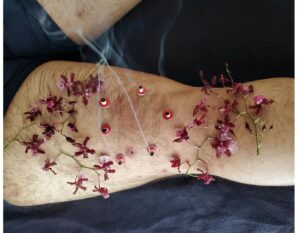胃痛
不安なことがあると胃が急に痛んだり、食べ過ぎた次の日は胃がもたれて苦しかったり、日々の生活が、胃の不調として現れることがあります。ストレスや心配事などがあると、胃の運動機能が低下し、食べ物を消化する力も弱くなり、食欲がなくなります。また、朝起きて吐き気がする時は、原因として、暴飲暴食やアルコール・刺激性食品の摂り過ぎによる胃粘膜の荒れが考えられます。また、寝ている間の空腹時に、胃酸の分泌が過多になったり、胃の内容物が食べ過ぎによって寝ている間に消化されなかったりした場合に、吐き気を感じることがあります。胃痛のほかにも、お腹が張ってくることもあります。お腹上部のみぞおちあたりが膨れた感じがしたり、下腹部のへそまわりが張った感じがします。上部のみぞおちあたりが膨れるのは、食べ過ぎて胃に負担がかかっていることが多く、下部のへそまわりが張るのは、腸内でガスが発生していることや便秘が原因の事があります。また、逆流性食道炎は、酸性度の高い胃酸が食道に逆流して炎症が起きる病気です。胃には胃酸から守る粘膜がありますが、食道には胃酸を防御する膜がありません。そのため胃酸にさらされ続けた食道の粘膜には炎症が起きます。以前は胃の入口にある筋肉が弱った高齢者に多かったのですが、近年は年齢に関係なく、逆流性食道炎は起こっています。若年性の場合は、食べ過ぎやストレスから、胃酸が増えたり、姿勢が悪く胃が圧迫されて、胃液が逆流しやすいために起こっている時もあります。慢性的な胸やけをはじめ、酸っぱいものや苦いものがこみ上げてきたり、風邪でもないのにのどがずっとイガイガしたりするときは、逆流性食道炎の可能性があります。胃は食べ物を消化するために強力な酸を出しています。通常は粘膜に保護されているので、胃が傷つくことはありませんが、胃の中のバランスが崩れると、胃酸が粘膜を攻撃し、胃痛という症状が現れます。バランスを崩す原因として挙げられるのは、主にストレスと食生活です。精神的なストレスや心の重圧感を感じた時、胃がキリキリと痛みます。これは、胃の働きをコントロールしている自律神経がストレスによってバランスを崩し、胃酸を過剰に分泌したり、胃を守る胃粘膜の機能が低下したために起こります。ストレスによる胃痛は主に空腹時に感じることが多いです。この時の胃は、粘膜が傷ついて炎症や潰瘍ができやすくなっている状態です。胃潰瘍など、病気につながることもあるので注意が必要です。辛い物やアルコール、カフェインなど刺激物の多いものをたくさん摂ると、胃の粘膜が直接刺激されて胃痛を引き起こす可能性があります。冷たい物や塩気の強い物、脂っこい物なども刺激物も注意が必要です。また一度にたくさん食べてしまった食べ過ぎの状態は、消化が間に合わず、長い時間胃にとどまるため負担がかかりやすくなります。消化を促すために過剰分泌される胃酸によって、胃の粘膜への刺激も増加。胃痛や胃もたれの他、食道まで上がってくる胃酸によって胸やけを感じる場合も。胃が膨らむことでお腹が突っ張る痛みを感じることもあります。鍼灸には胃痛の原因となるストレスを緩和するだけでなく、胃腸の状態を整える働きがあります。ツボには、胃液の分泌促進、胃液の分泌抑制のなどの作用があるものがあります。このようなつぼを組み合わせて、痛みを緩和させ、原因となるストレスを緩和、心身を健全に保ち、健康な胃に導きます。胃のツボで、有名なものに胃の六つ灸があります。左右合わせて背中に六つの経穴、ツボに鍼をして治療する方法です。胃の六つ灸を刺激することで胃酸分泌促進効果があるといわれています。鍼灸には胃経という胃につながる経路のあり、胃腸の調子を整え、疲労を回復する効果もあります。
Anxiety can cause a sudden pain in the stomach, or the next day after overeating, the stomach may suffer from lethargy, and daily life may manifest itself as stomach problems. Stress and anxiety can reduce the motility of the stomach and its ability to digest food, resulting in loss of appetite. In addition, when you wake up in the morning and feel nauseous, the cause may be irritation of the gastric mucosa due to binge eating or excessive intake of alcohol or stimulant foods. Nausea may also be experienced on an empty stomach while sleeping, when there is excessive secretion of stomach acid or when the contents of the stomach are not digested during sleep due to overeating. In addition to stomach pain, the stomach may also become tight. You may feel bloated in the upper part of the abdomen, around the dreary belly button, or tense in the lower part of the abdomen, around the navel. The bloating in the upper part of the abdomen is often caused by over-eating, which puts a strain on the stomach, while the lower part of the abdomen around the navel may be tense due to gas in the intestines or constipation. Reflux esophagitis is an inflammatory disease caused by the backflow of highly acidic stomach acid into the esophagus. The stomach has a mucous membrane that protects against stomach acid, but the esophagus has no membrane to protect against stomach acid. Therefore, the mucous membrane of the esophagus that is continuously exposed to stomach acid becomes inflamed. In the past, reflux esophagitis was more common in elderly people with weakened muscles at the entrance to the stomach, but in recent years, reflux esophagitis has been occurring regardless of age. In younger patients, it is sometimes caused by increased stomach acidity due to overeating or stress, or pressure on the stomach due to poor posture, which leads to easy reflux of gastric juices. If you experience chronic heartburn, sour or bitter taste, or a constant irritation in your throat even when you do not have a cold, you may have reflux esophagitis. The stomach produces powerful acid to digest food. Normally, the stomach is protected by the mucous membrane, so it is not damaged, but when the balance in the stomach is upset, stomach acid attacks the mucous membrane and the symptom of stomach pain appears. The main causes of imbalance are stress and diet. The stomach aches and pains when one feels emotional stress or a sense of emotional pressure. This is caused by an imbalance in the autonomic nervous system, which controls the function of the stomach, due to stress, resulting in excessive secretion of stomach acid and a decrease in the function of the gastric mucosa that protects the stomach. Stress-induced stomach pain is often felt mainly on an empty stomach. The stomach at this time is in a state where the mucosa is damaged and inflammation or ulceration can easily occur. It is important to note that this can lead to illnesses such as gastric ulcers. Consuming a lot of stimulants such as spicy food, alcohol, and caffeine can directly stimulate the mucous membrane of the stomach and cause stomach pain. Cold, salty, or fatty foods are also stimulants that require attention. In addition, overeating, where a lot of food is eaten at one time, is more likely to cause a burden because the food is not digested in time and remains in the stomach for a long time. Stomach acid, which is over-secreted to promote digestion, also increases irritation to the stomach mucosa. In addition to stomach pain and lethargy, stomach acid that rises up to the esophagus may cause heartburn. The stomach may also swell, causing a stomach ache. Acupuncture not only relieves the stress that causes stomach pain, but also helps to regulate the condition of the gastrointestinal tract. Some acupuncture points act to promote gastric juice secretion, inhibit gastric juice secretion, and so on. The combination of these acupressure points can relieve pain, relieve causative stress, maintain a healthy mind and body, and lead to a healthy stomach. One of the most famous acupuncture points for the stomach is the six moxibustion points on the stomach. This is a method of treatment in which acupuncture needles are applied to six acupuncture points on the back (left and right sides together). It is said that stimulating the six moxibustion points on the stomach has the effect of stimulating gastric acid secretion. Acupuncture also has the effect of tonifying the gastrointestinal tract and relieving fatigue, as acupuncture has a pathway that leads to the stomach called the gastric meridian.

#stomachache #stomachaches #胃痛 #食べ過ぎ #飲み過ぎ #guthealth #guthealthmatters
#メンタルヘルス #digestivehealth #bloating #bowelmovement #お腹が張る #stress


